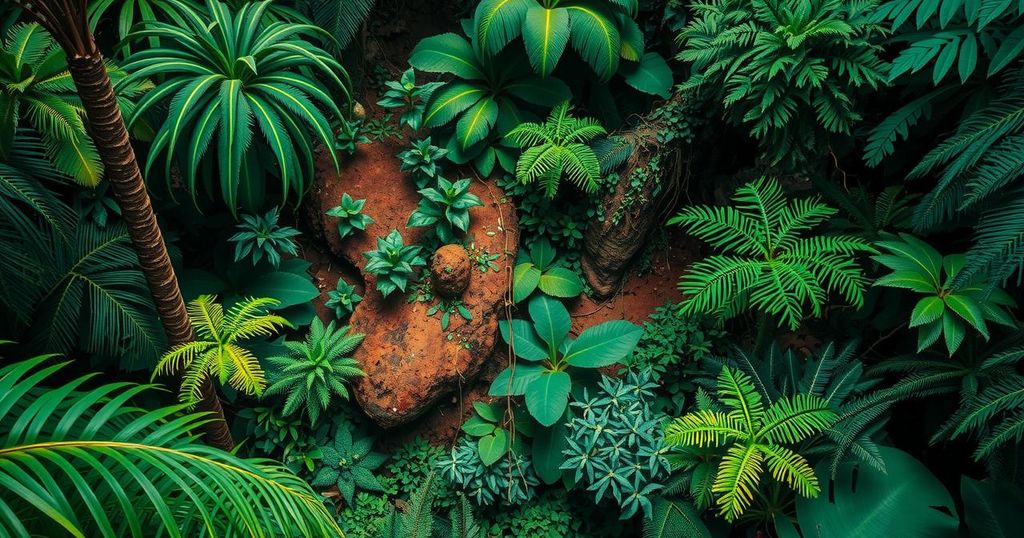Business
economics
Technology
AMAZON, ASIA, AUSTRALIA, COURT, CUBA, ECONOMIC DEVELOPMENT, ECONOMIC IMPACT, ECONOMICS, ECONOMY, ECUADOR, ENERGY, GLOBAL ECONOMY, GOLDMAN, INSIDE CLIMATE NEWS, KIWARO, LUIS ENQUERI, MINING ASSOCIATION OF CANADA, NEWS, NORTH AMERICA, OCEANIA, PERU, PIERRE GRATTON, SOUTH AMERICA, TAIWAN, UNITED STATES
Leila Ramsay
0 Comments
Waorani People Fight for Rights Amid Oil Extraction Threats in Ecuador
The Waorani people in Ecuador are challenging government-backed oil rights on their ancestral land. Meanwhile, Taiwan’s Indigenous communities face digital misinformation, while Peru’s Mari Luz Canaquiri wins the Goldman Prize for river rights recognition. In Australia, Indigenous students explore aviation careers, and a UNESCO report calls for support for Indigenous media organizations, revealing funding shortages as a major hurdle. These developments underline a broader global struggle for Indigenous rights and representation.
In Ecuador, the Waorani people are fiercely defending their rights against government-backed oil extraction on their ancestral lands. This situation unfolds in the Ecuadorian Amazon rainforest, and it has implications for Indigenous consultation rights globally. The government recently initiated an auction of oil rights estimated at $700 million after a hasty meeting with Waorani representatives who spoke only Spanish and provided little clarity on the impact of oil drilling.
The Waorani have countered this move with legal actions. In 2019, they filed a lawsuit with 16 communities against several federal ministries, claiming their right to free, prior, and informed consultation (FPIC) was violated. This principle, rooted in international law and given weight by Ecuador’s own constitution, mandates that Indigenous groups be involved in decisions that affect them. However, the core issue lies in whether their consent is mandatory for oil projects to proceed.
A significant legal milestone was achieved in 2019 when a provincial court sided with the Waorani, acknowledging that their FPIC rights had been breached. Now, the case is before Ecuador’s Constitutional Court, which is tasked with clarifying the national laws regarding consultation. In the meantime, the push for new oil auctions continues to threaten their communities again.
Luis Enqueri, a prominent Waorani leader, expressed their resolve, stating, “We do not want extractivism. We are fighting for the Constitutional Court to say that we alone have the right to decide what happens in our land.” This fight resonates beyond borders, drawing attention to the ongoing struggles of Indigenous peoples worldwide.
Meanwhile, in Taiwan, Indigenous communities are facing an alarming rise in digital misinformation. This new kind of threat not only distorts their cultures but also fosters political divides. Instances of misleading posts claiming historical alliances during Taiwan’s 228 Incident and other errors showcase how AI-generated content can perpetuate old injustices. Indigenous languages are systematically misclassified, further adding to their marginalization.
Despite these challenges, AI could also serve as a tool for cultural empowerment if utilized correctly. In New Zealand, Māori broadcasters have collaborated to develop a speech model that accurately transcribes their language, illustrating the benefits of Indigenous-led technology initiatives. Such proactive approaches could turn the tide against digital colonialism.
Meanwhile, in Peru, Mari Luz Canaquiri Murayari has gained international recognition for her environmental activism. She was awarded the esteemed Goldman Environmental Prize for her instrumental role in legally recognizing the Marañón River as a living entity with rights deserving of protection. This landmark ruling came after significant legal battles to assert the river’s rights against threats from oil extraction, aiming to ensure it remains free-flowing and uncontaminated.
Despite the triumph, challenges remain. New legislation is complicating the landscape, making it harder for NGOs to act against state injustices. Canaquiri passionately remarked, “The government must stop killing nature and start protecting it. Otherwise, what hope will our children have?” Her words underscore the ongoing fight for environmental and Indigenous rights.
In Australia, Indigenous students have been given a rare opportunity to explore aviation careers through a program called Raising Horizons. At the Royal Flying Doctor Service base in Townsville, students from NRL Cowboys House engaged with various roles in the aviation industry. Daniel Joinbee from Gunggandji Aerospace emphasized that the initiative aims to inspire First Nations youth by connecting them with industry role models.
Lastly, a recent UNESCO report has highlighted the critical need for support and funding for Indigenous media. Shane Taurima, a key figure in this area, remarked on the dire state of Indigenous media organizations, many of which are severely underfunded and lack essential resources. The report revealed that overwhelming numbers of Indigenous media groups view funding shortages as a significant obstacle.
The journey toward equity and rights for Indigenous communities remains fraught with difficulties. Yet, stories of resilience and sustainable movements inspire hope. It is clear that whether it is in Ecuador, Taiwan, Peru, Australia, or globally, the fight for Indigenous rights and recognition continues to evolve, shaped by their struggles and victories.
The ongoing struggles of Indigenous people worldwide, from the Waorani of Ecuador to communities in Taiwan and Peru, highlight a persistent fight for rights, recognition, and representation. As these communities bravely advocate against exploitation and misinformation, they also lay foundational work toward a more equitable future. Their victories, such as the legal recognition of natural entities and efforts to incorporate Indigenous voices in technology, showcase how resilience can drive change. However, the path forward is still marred with significant barriers, requiring concerted efforts and support from around the globe to ensure true justice and respect for Indigenous rights. Their stories serve as crucial reminders that the fight is not just for land, but for identity, culture, and survival.
Original Source: ictnews.org




Post Comment